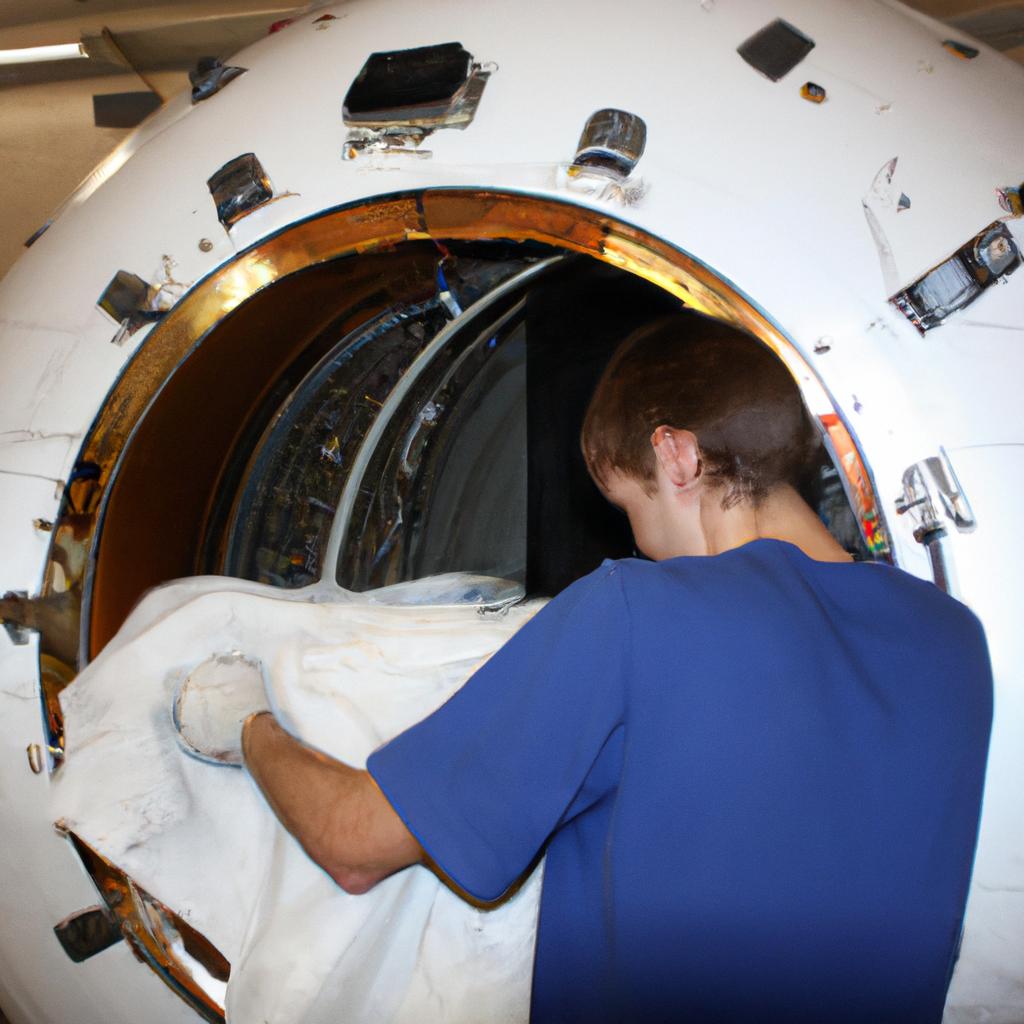The aerospace and defense industry plays a critical role in national security, requiring significant financial investments to support its complex operations. As companies within this sector seek funding for their projects, one important aspect that comes under scrutiny is their credit history. Credit history serves as an indicator of an organization’s financial stability and ability to repay loans, making it crucial for lenders to assess the creditworthiness of these entities before extending any financial assistance. This article explores the significance of credit history in the aerospace and defense sector with a specific focus on security loans.
Consider a hypothetical case study involving Company X, a leading aerospace manufacturer known for developing cutting-edge military aircraft. In order to secure funding for a new project aimed at enhancing national defense capabilities, Company X approaches various lending institutions seeking substantial capital infusion. However, lenders are cautious about providing such large sums without thoroughly evaluating the company’s credit history. They analyze factors like past loan repayment behavior, debt-to-income ratio, and overall financial health to determine whether granting the requested loan aligns with acceptable levels of risk. Thus, understanding how credit history impacts access to financing becomes paramount in ensuring successful implementation of aerospace and defense initiatives.
Importance of Credit History in Aerospace and Defense Financing
Imagine a scenario where an aerospace and defense company is seeking financing to develop cutting-edge technology for a new fighter jet. They approach various lenders, each assessing their creditworthiness based on the company’s financial health and track record. This example highlights the significance of credit history in securing loans within the aerospace and defense industry.
The Role of Credit History:
In this highly specialized sector, lenders place great importance on evaluating a company’s credit history as it provides valuable insights into its financial stability. A strong credit history demonstrates that a company has consistently met its financial obligations, indicating reliability and reducing potential risks for lenders. On the other hand, poor or limited credit history may raise concerns about a borrower’s ability to repay debts, leading to higher interest rates or even loan rejections.
- Reliable payment behavior builds trust with lenders.
- Consistent repayment records enhance credibility in securing larger loan amounts.
- Past defaults or delinquencies can negatively impact borrowing opportunities.
- Establishing a positive credit history takes time but opens doors for future financing possibilities.
Table: Factors Influencing Creditworthiness
| Factor | Impact on Creditworthiness |
|---|---|
| Length of Credit History | Longer history = Positive |
| Timely Payments | Regular payments = Positive |
| Debt-to-Income Ratio | Lower ratio = Positive |
| Public Records (Bankruptcies) | No public records = Positive |
Understanding how important credit history is in aerospace and defense financing leads us to examine the factors that affect creditworthiness within this industry. By considering these key aspects, companies can strategically position themselves to secure favorable lending terms and expand their operations further.
[Next section: Factors Affecting Creditworthiness in Aerospace and Defense Industry]Factors Affecting Creditworthiness in Aerospace and Defense Industry
Having understood the significance of credit history in securing financing for aerospace and defense projects, it is imperative to examine the various factors that influence creditworthiness within this industry. This section will delve into these factors, shedding light on how they shape lenders’ decisions when assessing loan applications.
Factors Affecting Creditworthiness:
To illustrate these factors, let us consider a hypothetical case study involving a company seeking funding for an innovative satellite project. The following are some key elements influencing their creditworthiness:
-
Project Viability:
- Demonstrated expertise in executing similar projects
- Feasibility studies indicating sound technical capabilities
- Revenue projections based on market demand analysis
-
Company Stability:
- Financial stability demonstrated by consistent cash flows
- Strong balance sheet with adequate assets to cover liabilities
- Long-standing relationships with reputable suppliers and clients
-
Regulatory Compliance:
- Adherence to national and international legal requirements
- Conformity with safety standards specific to aerospace operations
- Robust risk management protocols implemented
-
Reputation:
- Track record of successful delivery within agreed timelines
- Positive feedback from customers, partners, and industry peers
- Recognition of achievements through awards or certifications
These factors collectively contribute to evaluating the creditworthiness of aerospace and defense companies seeking loans for their projects. Lenders assess them rigorously, ensuring prudent allocation of capital resources while minimizing potential risks.
By considering each aspect mentioned above, lenders can gauge not only the financial viability but also the overall suitability of extending loans to applicants within this highly specialized sector. In doing so, they mitigate risks associated with non-repayment or project failure, safeguarding their investments.
Understanding how creditworthiness is assessed in the aerospace and defense industry lays a strong foundation for exploring the types of loans available to support these ventures. With this knowledge in mind, we will now turn our attention to examining various financing options specifically tailored for this sector.
Types of Loans Available for Aerospace and Defense Sector
In the aerospace and defense industry, creditworthiness plays a crucial role in determining whether companies can secure loans to fund their operations. Various factors influence the creditworthiness of businesses operating in this sector. Understanding these factors is essential for both lenders and borrowers.
For instance, let us consider the case study of Company X, an established aerospace manufacturer with a strong track record of delivering high-quality products to its clients. Despite its reputation, Company X experienced financial difficulties due to delays in government contracts caused by budget cuts. As a result, they needed additional funding to bridge the gap between project completion and payment receipt.
Several key factors affect the creditworthiness of companies like Company X:
-
Financial Stability: Lenders evaluate a company’s financial stability by considering factors such as cash flow, profitability ratios, assets, liabilities, and liquidity. These indicators provide insights into how well a business can meet its financial obligations.
-
Market Conditions: The aerospace and defense industry is heavily influenced by market conditions. Factors such as economic downturns or changes in government spending policies can significantly impact companies’ revenue streams and ability to repay loans.
-
Contractual Agreements: Companies operating in this sector often rely on long-term contractual agreements with government agencies or private organizations. Lenders assess the terms and conditions of these contracts to ensure stable income flows that can support loan repayment.
-
Technological Innovation: In today’s rapidly evolving landscape, technological innovation is critical for success in aerospace and defense industries. Lenders consider companies’ investment in research and development (R&D) activities as an indicator of future growth potential.
To further illustrate these points, below is a table highlighting specific examples related to each factor affecting creditworthiness:
| Factor | Example |
|---|---|
| Financial Stability | Company X’s positive cash flow |
| Market Conditions | Government budget cuts affecting revenue |
| Contractual Agreements | Long-term contract with a government agency |
| Technological Innovation | Investment in R&D for advanced technologies |
Considering these factors, lenders assess the creditworthiness of aerospace and defense companies to determine their eligibility for loans. By analyzing financial stability, market conditions, contractual agreements, and technological innovation, lenders can make informed decisions that mitigate risks associated with lending to this sector.
Understanding the factors influencing creditworthiness is crucial not only for lenders but also for credit rating agencies operating within the aerospace and defense industry. The role of these agencies will be explored in detail in the next section – “Role of Credit Rating Agencies in Aerospace and Defense Financing.”
Role of Credit Rating Agencies in Aerospace and Defense Financing
Having discussed the various types of loans available to support aerospace and defense projects, it is essential to explore the role of credit history in securing such financing. A strong credit history plays a significant role in determining the feasibility of obtaining security loans specifically designed for this industry.
Security loans are an important avenue for aerospace and defense companies seeking financial assistance. These loans require borrowers to provide collateral as a form of security against the loan amount. For instance, consider Company X, an established aerospace manufacturer with a solid track record but limited liquid assets. By leveraging their existing aircraft fleet as collateral, Company X can secure a substantial loan to fund research and development initiatives or expand production capabilities.
To help you better understand the significance of credit history when applying for security loans in the aerospace and defense sector, here are some key points:
-
Establishing Trustworthy Borrowers:
- Lenders rely on credit history to evaluate the trustworthiness of potential borrowers.
- A positive credit history indicates responsible financial behavior and enhances confidence in repayment capability.
-
Impact on Loan Amounts:
- A favorable credit history increases the chances of receiving larger loan amounts.
- Lenders may be more willing to extend higher loan limits based on past reliability and demonstrated ability to manage debt.
-
Negotiating Interest Rates:
- Good credit histories often enable borrowers to negotiate lower interest rates.
- Lenders may view applicants with excellent credit as less risky investments, resulting in more favorable borrowing terms.
To further illustrate these concepts, refer to Table 1 below which outlines hypothetical scenarios showcasing how different levels of credit rating impact loan eligibility:
Table 1: Hypothetical Case Study – Impact of Credit Ratings on Loan Eligibility
| Credit Rating | Loan Amount Eligibility |
|---|---|
| Excellent | $10,000,000 |
| Good | $7,500,000 |
| Average | $5,000,000 |
| Poor | $2,500,000 |
In summary, credit history plays a critical role in obtaining security loans within the aerospace and defense sector. A strong credit profile not only increases the likelihood of loan approval but also impacts borrowing terms such as loan amounts and interest rates. As we delve deeper into this topic, let us now explore the challenges faced by companies seeking financing for aerospace and defense projects.
Understanding the importance of credit history sets the foundation for comprehending the challenges encountered when attempting to secure financing for aerospace and defense projects. These obstacles arise due to various industry-specific factors that hinder access to adequate funding sources.
Challenges in Obtaining Financing for Aerospace and Defense Projects
Having discussed the role of credit rating agencies, we now turn our attention to the challenges faced when seeking financing for aerospace and defense projects. To illustrate these challenges, let us consider a hypothetical case study involving a small aerospace company that specializes in manufacturing advanced military aircraft.
Section:
The fictional company, Alpha AeroTech, has recently developed a groundbreaking stealth technology that could revolutionize aerial combat capabilities. However, despite its innovative product, Alpha AeroTech encounters several obstacles when attempting to secure adequate funding for production. These challenges are not unique to this fictional scenario but reflect broader issues faced by companies operating within the aerospace and defense sector.
Firstly, one significant obstacle is the high level of risk associated with investing in such projects. The nature of aerospace and defense endeavors entails substantial upfront costs coupled with long development cycles before any potential returns can be realized. As a result, traditional lenders may view these ventures as inherently risky and be hesitant to provide financing without stringent collateral requirements or exorbitant interest rates.
Secondly, regulatory hurdles further complicate the process of obtaining financing for aerospace and defense projects. Given the sensitive nature of products involved in this industry, governments often impose strict regulations on both domestic and international trade agreements related to security-sensitive technologies. Compliance with these regulations adds complexity to financial transactions and can extend approval timelines significantly.
Lastly, geopolitical factors play a crucial role in determining access to funding sources for aerospace and defense companies. Political tensions between countries can lead to restrictions on cross-border investments or procurement opportunities. Such limitations restrict market reach and limit options available for securing necessary funds from foreign investors or customers.
These challenges underscore the need for effective strategies tailored specifically towards addressing them in order to facilitate successful financing within the aerospace and defense industry.
To further highlight the challenges faced in obtaining financing for aerospace and defense projects, consider the following points:
- Limited access to traditional lending options due to perceived risks
- Lengthy approval processes resulting from stringent regulatory requirements
- Geopolitical uncertainties leading to restricted market opportunities
- Higher costs associated with security compliance measures
(Table format)
| Challenges in Obtaining Financing for Aerospace and Defense Projects |
|---|
| 1. Limited access to traditional lending options due to perceived risks |
| 2. Lengthy approval processes resulting from stringent regulatory requirements |
| 3. Geopolitical uncertainties leading to restricted market opportunities |
| 4. Higher costs associated with security compliance measures |
Transition into subsequent section:
Understanding these challenges highlights the significance of maintaining a good credit history within the aerospace and defense industry.
Benefits of Maintaining a Good Credit History in Aerospace and Defense
Despite the numerous challenges faced by aerospace and defense projects when it comes to obtaining financing, maintaining a good credit history can significantly mitigate these hurdles. By demonstrating a solid track record of financial responsibility and reliability, companies operating in this industry can enhance their chances of securing loans from lenders who are more willing to invest in long-term projects with high capital requirements.
Example: For instance, consider Company X, a leading aerospace manufacturer that specializes in military aircraft production. Due to the substantial costs associated with research and development, as well as manufacturing complex defense systems, Company X often finds itself facing difficulties in securing sufficient funding for its ambitious projects. However, by diligently maintaining an excellent credit history over the years, consistently meeting financial obligations such as loan repayments and vendor payments on time, Company X has been able to establish a strong reputation among lenders as a reliable borrower worthy of further investment.
Paragraph 1:
One key benefit of having a positive credit history is increased access to favorable interest rates and loan terms. Lenders view borrowers with exemplary credit histories as lower risk individuals or entities, resulting in them being more likely to extend loans at competitive interest rates. This enables aerospace and defense companies to save significant amounts on interest expenses over the life of the loan, freeing up valuable resources that can be reinvested into future projects or used for other business needs.
- Lower interest rates reduce overall borrowing costs.
- Enhanced cash flow due to reduced monthly payment obligations.
- Improved ability to negotiate better terms with lenders.
- Increased flexibility for pursuing additional growth opportunities within the industry.
| Benefit | Description |
|---|---|
| Reduced Borrowing Costs | Lower interest rates translate into decreased overall borrowing expenses |
| Improved Cash Flow | Reduced monthly payment obligations result in improved cash flow |
| Better Negotiation Power | A positive credit history allows for more leverage when negotiating loan terms and conditions |
| Increased Flexibility | Having a good credit history provides the freedom to explore additional growth opportunities within the aerospace and defense sector |
Paragraph 2:
Moreover, maintaining a strong credit history can enhance an organization’s reputation in the industry. Aerospace and defense projects often require collaboration with various stakeholders such as suppliers, subcontractors, and strategic partners. These entities are likely to assess a company’s credibility before entering into any business arrangements. By exhibiting financial responsibility through a pristine credit history, companies can instill confidence in potential collaborators, making it easier to form partnerships that facilitate project success.
In conclusion, the significance of maintaining a good credit history cannot be overstated in the aerospace and defense industry. Through consistent adherence to financial obligations and responsible borrowing practices, companies can secure financing on favorable terms while enhancing their overall credibility within the sector. This enables them to pursue ambitious projects that contribute to technological advancements and national security without being hindered by financing challenges.
 Louth Online
Louth Online



